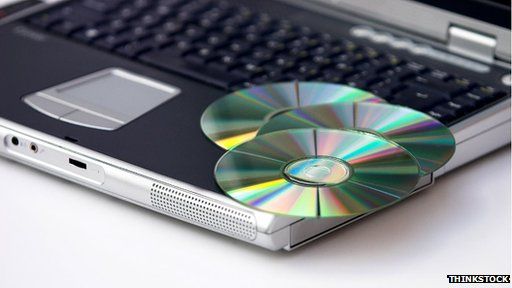UK legalises music, film and e-book back-ups
- Published

A law has come into effect that permits UK citizens to make copies of CDs, MP3s, DVDs, Blu-rays and e-books.
Consumers are allowed to keep the duplicates on local storage or in the cloud.
While it is legal to make back-ups for personal use, it remains an offence to share the data with friends or family.
Making such copies - including ripping CDs to iTunes - had previously qualified as copyright infringement, although cases were rarely prosecuted.
The changes were detailed in June, when the Intellectual Property Office (IPO) issued guidance, but had not come into effect until now.
"These changes are going to bring our IP [intellectual property] laws into the 21st century," said the minister for Intellectual Property, Baroness Neville-Rolfe.
"They will mean that the UK IP regime will now be responsive to the modern business environment and more flexible for consumers."
The change to the law also allows the parody of copyright works. Previously, there has been a risk of being sued for breach of copyright if clips of films, TV shows or songs were used without consent.
DRM remains
There are limits to the change of rules.
For instance, while consumers can copy any CD they own and use one version in the car and another at home, they cannot later sell on the original disk if they retain the duplicates of it or MP3 conversions of its songs.
Users are not allowed to make recordings of streamed music or video from Spotify and Netflix, even if they subscribe to the services. Likewise, they cannot rip a rented Blu-ray, video game, e-book or other file.
And while it is legal to change a purchased TV download, movie file or e-book from one format to another, retailers including Amazon, Apple and Google are still allowed to include digital rights management software that makes this hard to achieve.
"The law does not say that things have to be un-DRM-ed," said Alice Enders, from the media consultancy Enders Analysis.
"If anything the pressure will increase - content owners will become more concerned about selling products to consumers that isn't 'wrapped.'
"They don't want their works to be copied without compensation. They want to either sell it, or rent it to you or get you on a subscription. No money comes from a copy."
She noted that unlike in most European countries, content creators were not being compensated by the UK for the extra rights.
Many EU nations place a levy on sales of recordable media - such as blank DVDs, memory cards and hard disks - and some also add a charge to MP3 players and video recorders, with the proceeds passed on to the media industry.
- Published20 October 2014
- Published29 July 2014
- Published14 February 2014